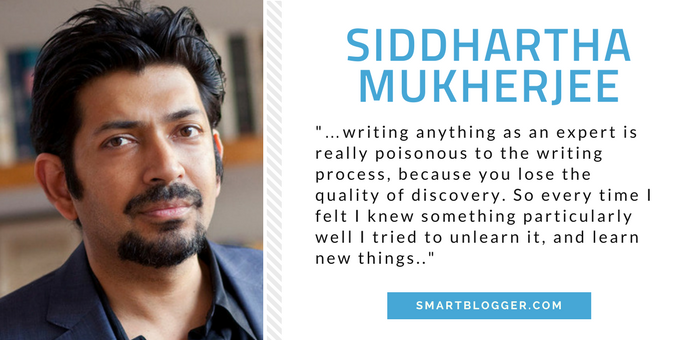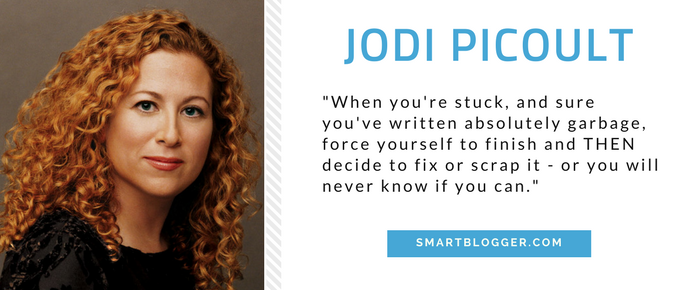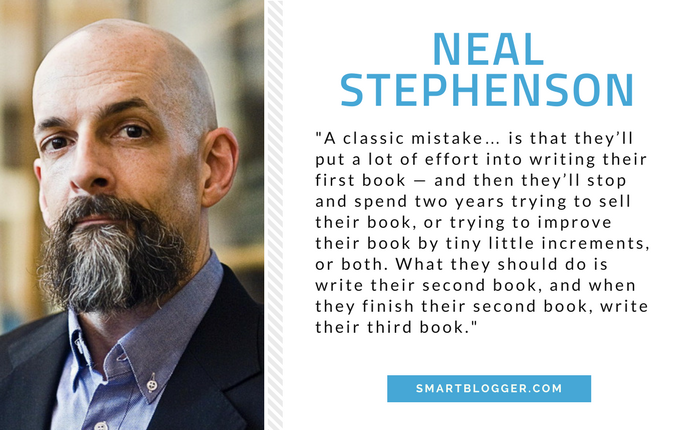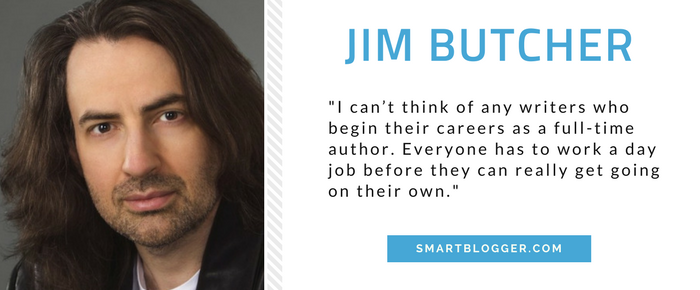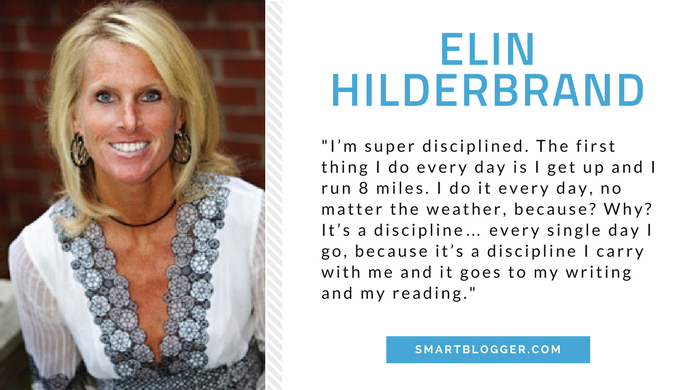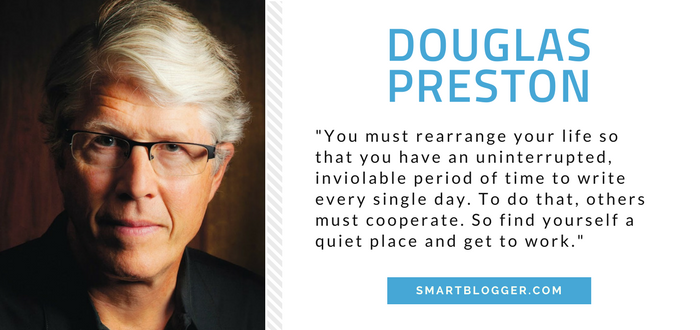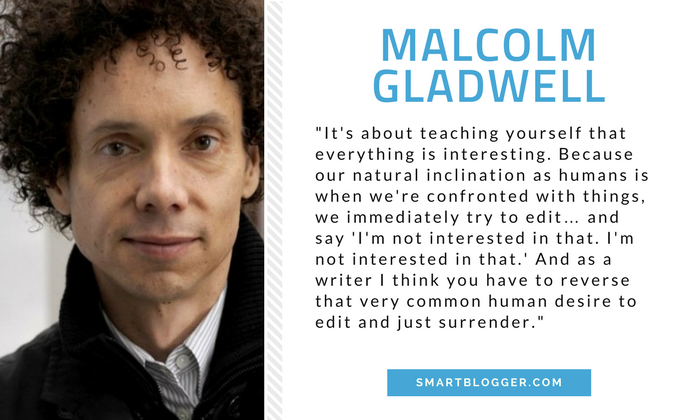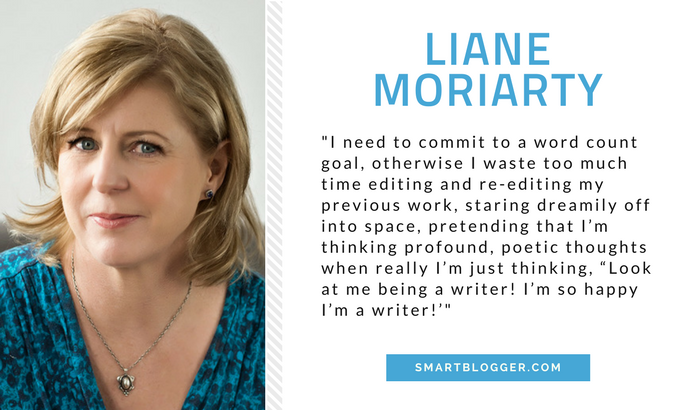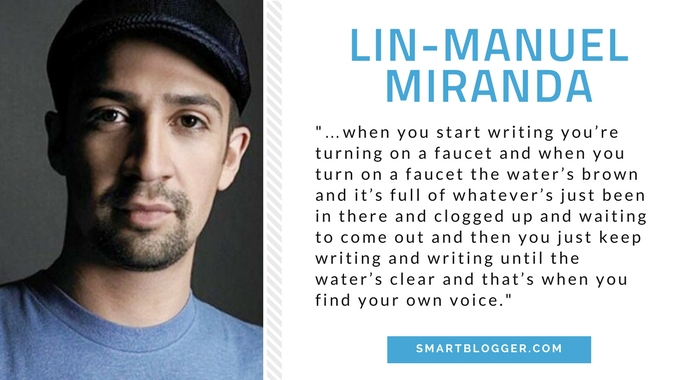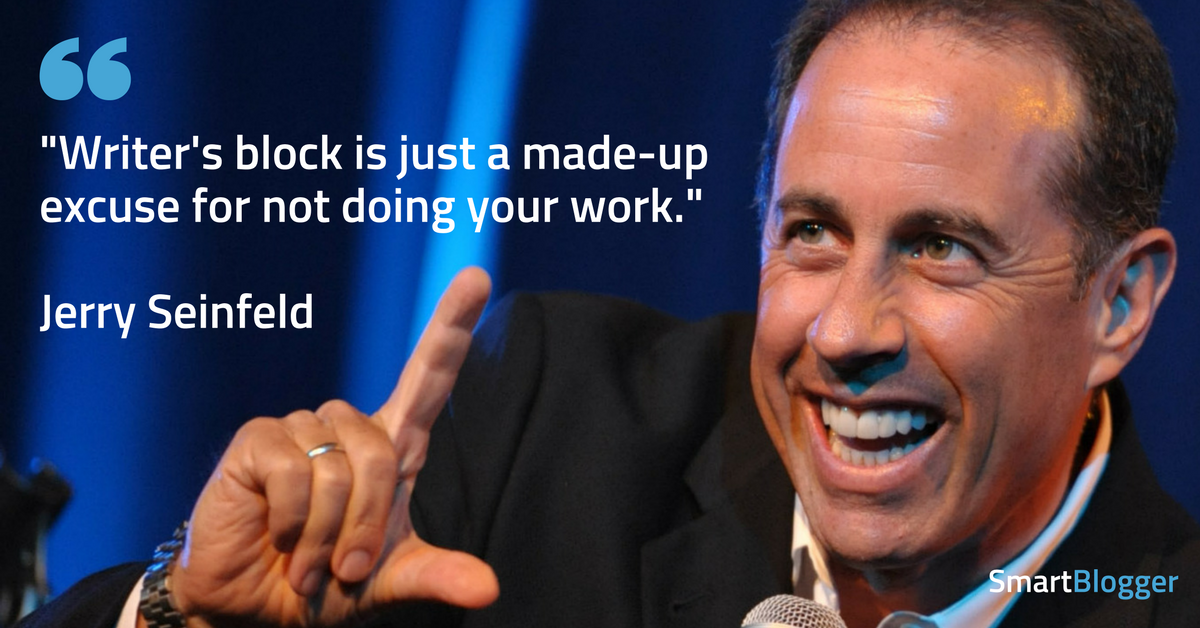
Ugh, it happened again.
Another week or month has passed, and you’ve made zero progress on your writing goals.
Deep down you know your writing is important, but you can’t take consistent action.
What’s really going on here?
The truth is, you don’t feel inspired.
You can’t help but marvel at other writers who do persist, and have a large body of work you can’t even fathom achieving.
How do you get there?
How do you find the inspiration you need to stay the course long enough to become the prolific, popular, and successful writer you dream of becoming?
The Dirty Little Lie You Tell Yourself About Inspiration
If you’re struggling to find inspiration, you might be guilty of “believing in magic” when it comes to your writing career.
People who fail to do the things they say they want to do believe in fairy tales, like this one:
One day, for no reason whatsoever, I will find the ultimate source of inspiration that will carry me through to the end of the writing career rainbow. It will happen in an instant, and I’ll never have to “start over” again.
They believe successful writers have “made it,” and have no problem staying motivated because they’ve “arrived.”
This couldn’t be further from the truth.
Regardless of how successful you are, there will be days you feel uninspired. In fact, what once seemed like a passion-filled calling can turn into a bit of a slog after a while.
Professional athletes love the game, but they don’t necessarily want to train their bodies every single day.
Business owners love money and recognition, but they don’t necessarily enjoy the process of getting their business off the ground.
You love expressing yourself with words, but you won’t necessarily enjoy each and every writing session.
“People often say that motivation doesn’t last. Well, neither does bathing — that’s why we recommend it daily.” — Zig Ziglar
You have to learn to inspire yourself every day if you want to turn pro and become a popular author or successful writer. To keep your inspiration fresh, you’ll have to find various unique ways to get inspired.
Fortunately, I have 101 different ideas for writers — use them whenever you’re struggling to turn intention into action.
So here’s how to get inspired to write:
1. Do the One Thing They Always Tell Writers Not to Do
Watch T.V. Some of the best writing in the world can be seen in the scripts of your favorite shows. Pay attention to the dialogue, listen for the clever
storytelling methods, and use them in your own writing.
Use the ideas of the show creator and the personalities of the characters to get inspired. Think about what goes through Don Draper’s mind when he writes an ad on Mad Men or the way Carrie Bradshaw wove her own life into her daily column on Sex and the City.
Once I paid attention to the writing in my favorite shows, I drew inspiration from the stories and turned a seemingly useless activity into creative fuel.
2. Read Your Old Love Letters
If you’ve been writing for a while, you must have gotten a compliment or two about your work. Keep a file with positive comments you’ve received about your writing. Whether they’re emails or blog comments, reading over compliments you received and hearing how you’ve helped people will motivate you.
3. Embrace Your Insignificance
Realize the universe doesn’t care about you. Oftentimes, we lack inspiration because of fear. We’re afraid because we feel like the world is waiting for us to fail, like there’s a spotlight shining on our inadequacy. We live on a planet that’s one of billions of planets in one of billions of galaxies, each of which contains billions of stars. In the grand scheme of things,
you’re insignificant. Nothing you do “matters,” except that it matters to you. Go for it, because you have nothing to lose.
4. Make the Subtle Shift from Goal-Setting to Habit-Forming
Goals give you inspiration by providing an end point, but habits weave inspiration into the core of your being and make it automatic.
Instead of saying, “I want to finish my manuscript,” say “I want to write 30 minutes per day.” The second statement comes without the pressure of expectation. You’re just putting yourself in a position for continual inspiration.
Habits trump goals every time. The most prolific writers aren’t the most goal-oriented. They’re built to show up every day and do the work.
5. Tell Yourself You’re Not Good Enough
I once heard a story about a successful real estate agent who was constantly asked about how to break into the industry. He gave them all the same answer, “Don’t get into real estate. You’re not cut out for it.” He gave that answer because he knows it acted as reverse psychology for those who were cut out for it, and filtered out those that weren’t. Try a little reverse psychology on yourself. Try to convince yourself you’re not good enough, and then get offended. Of course you’re good enough! You were born to write. Trick yourself to put a fire in your belly and get inspired.
6. Start a Chain Gang
Buy a calendar. Mark an x on the calendar each time you complete a writing session. When you complete a few days in a row, the x’s start to form a chain. The longer the chain grows, the more inspired you are to keep writing. Picture a calendar with 29 days marked off. You’d almost certainly write on day 30, right?
Visuals and imagery are powerful. Seeing a representation of the work you put in will inspire you to keep working.
7. Become the G.O.A.T.
Focus on becoming so great
you can’t be ignored. Most writers are worried about what the competition is doing and idolize their favorite writers. Instead, you’ll focus on being so good the competition will start to watch
you. Embrace the attitude of Michael Jordan in his first few seasons. He
knew the league was going to belong to him before it actually did. He put his head down, did the work, and demolished the competition to become the Greatest of All Time. You can be the same. Put your head down, write, and one day people will say “Who is
this?”
8. Take a Dump
Have a bowel movement. I first learned this
unusual writing tip from James Altucher. He says if your body isn’t “clear,” your mind won’t be either. You may also come up with some interesting ideas while you’re, erm, indisposed.
9. Embrace Your Inner Hulk
Get angry. Anger is easy to express. When you’re angry you know exactly why something pisses you off. What pisses you off about the world, your niche, or life in general? Vent your frustrations and the words will pour out.
10. Become a Better Writer Without Becoming a Better Writer
Have you ever seen a professional athlete who’s in a slump? Nothing about his routine changes, he plays with the same quality teammates, and the team is run by the same coaching staff. Later, you find out he was having
personal issues and that was the source of his decline.
Look at Tiger Woods. He never recovered from his personal scandal. What does that tell you? It tells you life outside your craft is just as important as practicing it, if not more.
Think about how many aspects of your life can affect your writing. Your diet, exercise routine (or lack thereof), relationships with friends and family, and stress level are a few among many factors influencing your writing. When you lack inspiration for writing, look at other areas of your life. If those aren’t going well, your writing will suffer.
11. Make It Impossible to Edit While You Write
Write with the monitor off or with white text. This is the definition of writing a crappy first draft. When you can’t even look at the words on the screen, you won’t be able to enter into self-editing hell while you’re writing. You’ll let loose and write with reckless abandon. Afterward, you can
clean up the carnage and make it pretty.
12. Imagine Your Worst-Case Scenario
Think about the worst-case scenario in terms of your writing career and decide you can handle it. Fortunately, the negative consequences are more emotional than tangible or financial in terms of things like writing a book. At the very least, you’re out of a small investment and your ego will get a little dent. You can’t sell
negative books. Your worst pain will be the feeling of rejection. Although rejection is a tough pill to swallow, you face bigger dangers in life without fail, like getting in a car and driving it, without batting an eye.
13. Start Acting Like a Child
What advice would a five-year-old give you about your writing? Would they tell you to focus hard, create solid outlines, and hit your daily word count? No. They’d tell you to have fun. Remember fun? When you were a child, you only cared about exploration. You didn’t waste time worrying about the future. The present was all you knew. I get it. You have “big dreams,” but if you take yourself too seriously, writing will get rote. If you’re feeling stuck trying to edit your manuscript, write something ridiculous. Write something totally unrelated to your niche for pure fun with no intention of publishing it. Act like a child and watch your curiosity and creativity flourish.
14. Dumb It Down
Stop trying to sound smart. Once you realize you don’t have to write with tons of flowery language and words that could be replaced with simpler words, writing gets easier.
People enjoy straightforward writing better anyway.
15. Make Money Your Muse
Take writing jobs as a freelancer if you’re looking to get writing without having to come up with your own ideas. As a freelancer you’ll work within the guidelines of what your client wants. This offers the benefit of money, plus you’ll develop a writing habit along the way.
16. Use your 9-to-5 to Fuel Your 5-to-9
Scott Adams, most known for his cartoon strip
Dilbert, used real-life experiences from his job as inspiration for his work. Charles Bukowski wrote a novel loosely based on his own experiences as a post office employee. Even mundane jobs like these can inspire you to write something interesting about them. Some say you should write what you know. What do you know better than the activity you perform 40 hours per week?
17. Discover the Life-Changing Magic of Tidying Up
Create an immaculate space for your writing. A cluttered environment clutters the mind. When you’re in a clean space, you can
feel it. That feeling can translate into a calm and focused state of mind while writing.
18. Don’t Believe the Myth
Remember this phrase from Jerry Seinfeld: “Writer’s block is just a made-up excuse for not doing your work.”
19. Sign Your Life Away
Create a contract with yourself. Make an actual signed document stating what you’re going to accomplish with your writing and place it somewhere prominent.
Imagine you’re sitting down to write and you look up to see an agreement you made with yourself, not just mentally, but physically. Wouldn’t that inspire you to hold to your commitment?
These little “nudges” might seem trivial on their own, but combining them changes your environment and makes it more conducive to productivity and creativity.
20. Make Your Writing Career a Family Affair
Communicate your goals with your family and friends.
Writing takes up time, and if you’re not clear about your intentions, your spouse or loved ones can start to resent and even become jealous of your writing. Let them know it’s important to you, set boundaries for when you’ll write, and when you’re not writing make sure you’re
100 percent off, meaning you’re spending time with the people you love and not in your head.
21. Get Meta
Write about how you feel about your writing. One of the most successful posts I’ve ever written talked about my
struggles with writing. It was meant to be a venting session, but I realized it was worth sharing. Like anger, frustration leads to expression.
22. Converse to Create
If you listen carefully, the conversations you have with other people can inspire you to take something they’ve said and run with it. Listen intently, and see if there’s anything in your dialogue that sparks interest or could be used as a writing topic. Cormac McCarthy said he used actual conversations with his son in the bestselling novel
The Road.
23. When Inspiration Fails, Try Desperation
Turn your pain into passion. If you feel the dull monotony of sitting in a cubicle every day pushing papers, working in a factory on the assembly line, or any other job that isn’t being a full-time writer,
use that desperation as fuel. Sometimes inspiration isn’t enough. Sometimes you have to get fed up to do the work.
24. WWJD
Ask yourself, “What would Jon do?” If you’ve been following Jon Morrow’s work for any amount of time, you know he has a no-excuses attitude and is driven to succeed. Would Jon give up on a writing session if he wasn’t “feeling it?” Would Jon cry in the corner about someone leaving a negative comment on his blog post? When in doubt, do what Jon does and bang out 1,000 words per day no matter what.
25. Create to Connect
It’s easy to get caught up in numbers — how many subscribers you have, how many views your website gets per month, and how many comments you receive — but remember,
you’re writing for real people. Even if you have just a few readers, get to know them. Send out an email to your tribe telling them they can each get 15 minutes on the phone with you to talk shop. Add prompts to your blog posts to encourage readers to share their lives with you. When you create with the intention of connecting with other human beings, it inspires you to work that much harder, because you can
feel the person on the other end of the screen.
26. Become the CEO of You, Inc.
Come up with a name for your publishing company. Perhaps you don’t have to go as far as creating an LLC, but do something to establish what you do as an actual career and not just a hobby. If it means spending $25 to get business cards printed, so be it. Something in your mind has to transition into feeling and acting like a pro.
27. Don’t Follow in the Footsteps of Great Writers
Let go of your need to be the next great author. When you compare yourself to the likes of Hemingway, Plath, or Murakami, it’s hard not to get discouraged about your own writing. Focus on becoming the best writer
you can be. There are plenty of successful — and financially independent — writers who aren’t legends, but are pretty damn good. Become pretty damn good.
28. Do the Math
Remind yourself: each time you sit down to write you’re ahead of 99 percent of other aspiring writers. Most people do nothing. They talk, wish, and wonder. The mere fact that your fingers are touching that keyboard makes you special.
Inspire yourself by reminding yourself you’re part of an exclusive club — the doers. I get inspired when I realize the steps I’ve already made go way beyond those of most people. Once your foot is in the door, step all the way through.
29. Answer Random Questions from Total Strangers
Answer questions on Quora. Users on Quora ask questions about topics ranging from personal development to health to what Kim Kardashian’s favorite color is. Other users on Quora answer these questions. Many authors and bloggers use Quora to practice their writing by answering questions. You’re also allowed to leave links in your Quora responses, and
many people drive traffic back to their websites through using Quora.
30. Get Zen, Then Pen
I meditate for 20 minutes every morning before I write. When you wake up, you usually start the day feeling anxious. The practice of meditation helps relieve stress and clears your mind of negative thoughts. You’ll feel refreshed before you pen your first word.
The headspace app comes with a series of guided meditations you can use to start fresh every day.
Leo Babauta of Zen Habits has a great introductory post on how to form a daily meditation habit. He also happens to be one of the most prolific and successful bloggers in the world. Coincidence? I think not.
31. Choose Quantity Over Quality
Write ten ideas per day around your writing. They could be ideas for new blog posts, book titles, and book sections or chapters. By the end of the year, you’ll have 3,650 ideas. Most of them will suck, some will be good, and a few will be amazing. Your creative muscles will be strong, and you’ll have endless material to write about.
32. Teach an Old Draft New Tricks
Revise an old piece of writing. This has a two-fold benefit. First, you’ll realize how much you’ve grown since writing that piece, which will give you the confidence to know you’ll improve in the future. Second, if you really add some beef to it, you’ll have a brand new piece of writing to share with the world.
33. Surround Yourself with Great Work
I once visited an art museum that had a photography section. It was filled with famous photos of famous people by famous photographers. I lost complete track of time and was immersed in the photos. When I left the display, I felt almost dizzy. That day, I went home and wrote a couple thousand words in a way that seemed effortless. Seeing great art in other forms can
inspire you to create great work yourself. Visit a gallery, go to an opera, or watch a play. Feel the passion and inspiration from the artists you just watched, and use it in your own writing.
34. Put a Pot of Gold at the End of Your Rainbow
Setting goals doesn’t often work. The reason why they don’t work is because
we don’t like to work! We want results. It’s why workout DVDs are called
Beach Body or
Six Pack Abs in Six Weeks instead of
Exercise Regimen for your Core. You know you’ll have to do the work, but the results are what compel you to get started. Create statements around the rewards you’ll reap from your writing and the results you want, e.g., “Writing my book will give me the money, attention, and sense of accomplishment I’ve always longed for. ” When you think of setting goals and building habits in terms of the rewards they’ll afford you, you’re more likely to follow through.
35. Drink Rocket Fuel to Skyrocket Your Inspiration
Drink coffee. Coffee has fueled the creative inspiration of writers for centuries. I’m not sure if it’s even possible to write well without it.
36. Journey into the Wild
Go for a walk in nature. There’s an odd connection between walking and inspiration. There’s something about wandering about that stirs up random thoughts in your mind. Ideas come to you when you aren’t so focused on them. A walk in nature will distract you with its beauty enough to make room for the muse to sneak up on you.
37. Switch Your Scenery
Imagine you’re lying back in a hammock in Bali. You’re surrounded by warm weather and a fresh breeze with a coconut by your side to sip on. You also have your laptop in your lap. That sounds like an inspiring environment to me. There has long been a link between travel and writing. Seeing new parts of the world is inspiring in and of itself, plus it will surely give you new material to write about as well. And even if you can’t make a physical trip, just spending a few minutes visualizing an exotic destination can provide valuable writing inspiration.
38. Devour People’s Brains
Read. Read. Read. You can’t be a great writer without being a great reader. Read a wide range of material. If you write non-fiction, sprinkle some fiction into your reading and vice versa. Reading widely opens new doors in your brain and helps you make odd connections between ideas.
I just finished my second book. I pulled and wove in ideas from billionaires, dead Roman emperors, and Harvard psychologists. I didn’t go searching for the information. I conjured it from the recesses of my mind while writing, because I’ve read 100 books in the past two years. It’s like Neo in the Matrix where he “downloads” the ability to fight in Kung Fu style.
With reading, you can “download” hundreds or thousands of years of human experience and use it at your disposal.
39. Write in This Insanely Inspiring Environment
Write in a bookstore. Writing in an environment surrounded with words is inspiring. Go to your favorite section and browse the titles. Seeing the names on book covers will cause you to picture your name on your first or next book, and you’ll be ready to pen your masterpiece.
40. Put a Gun to Your Head
I
submit guest post pitches to various blogs before I feel
ready to write them. Once my pitches get accepted, I can’t quit. As you know, it’s a big no-no to flake on a guest blog owner, and I’d never want to ruin my reputation. Finding situations that force your hand can keep you from sitting on the fence.
41. Search for Instant Inspiration
A quick Google search can give you inspiration by spoon-feeding you endless ideas for your writing. If you’re stuck on a topic to write about, do a search about your subject and run with the results. You don’t have to come up with new ideas by yourself all the time. You don’t even have to use the ideas you find to create a finished result. The process could serve the purpose of getting your fingers moving, which is the most important step.
42. Chase the Muse
Inspiration can be tricky to capture. To maximize your chances of spotting the muse, come up with clever traps. For example, you can come up with a writing problem you’re trying to solve right before bed, let it stir in your subconscious mind while you sleep, and wake yourself up in the middle of the night and jot down what comes to mind in your hazy subconscious state. You can set prompts on your phone to randomly write whatever comes to mind at the exact time. Carry a pen and paper with you everywhere you go to capture ideas as they come. It seems mechanical, but careful planning can inspire you to create more.
43. Star in Your Own Montage
Visualize yourself putting in the work it takes to
become a great writer. Visualizing the type of outcome you want is effective, but visualizing
becoming the type of person capable of achieving those outcomes is even more powerful. Take a few minutes every day and visualize yourself being in a state of flow and writing effortlessly. It’s like picturing yourself hitting the game-winning shot. If you can see it, you can believe it.
44. Find a Tango Partner
Find a writing partner to keep you accountable. Working with someone who’s “in the trenches” like you will help both of you inspire each other. There’s strength in numbers.
45. Find Inspiration in Your Rearview Mirror
We’ve all had moments in life we cherish. Why not use those moments as inspiration for your writing? If you’re feeling stuck, try to remember an amazing moment in your life — time spent with your children, a vacation you went on, your wedding day — and write about that. The moment will inspire you to write because the moment itself is inspiring. If it was a pivotal moment in your life, you can recall how you felt and what the atmosphere was like.
46. Eviscerate Your Excuses
Find examples to eliminate your excuses. The undisputed heavyweight champion of blogging, our very own Jon Morrow,
isn’t able to use his hands, and has written blog posts read by millions. Stephen Hawking moves his cheek muscles to write. You have
writer’s block? Boo hoo.
If seeing examples of people with legitimate obstacles thriving at what you do doesn’t inspire you, I don’t know what will. You’ve been blessed in one way or another. Regardless of what you don’t have, you have something someone else would kill for. Be grateful and use your gratitude as a well of inspiration to create.
47. Join a Local Gang
If one partner isn’t enough, you can join groups of writers to increase the effectiveness of group support. I’m part of a local writers’ club where we meet in person, and I’m a member of an online community of writers. We share insights and tips, and keep each other motivated.
48. Fake Your Own Death
Write your obituary. This exercise provides a two-fold benefit. First, you’re putting words on the page. Second, you’re thinking about the type of legacy you want to leave. My guess is you want “renown writer,” or at least “writer,” somewhere in the description. It will remind you of your ultimate mission and the fact you’ll regret it if you fail to follow through. As best-selling author Stephen Covey says, “Begin with the end in mind.”
49. Tune In to Tune Out Writer’s Block
Listening to music boosts your effectiveness in many areas such as exercise. It’s also a great tool to inspire your writing, as long as you don’t make it a distraction. Some writers have been known to play the same song on repeat while they write, saying it gives them a calming sense and the music fades to the background while they write. Music has been known to “set the mood” in more ways than one. Pick an inspiring song and let it inspire you to write.
50. Choose the Opinion You Like Best
Have you ever looked at the same piece of writing at different times and had
two different opinions?
We’re quick to look at the negative opinions of ourselves and our work and believe them to be true. We accept negativity with alarming ease. Our mind can just as easily believe the good things we tell ourselves about ourselves. The next time you swing between both opinions of your writing, choose the one that inspires you. It’s okay to toot your own horn (in your mind) when you’ve penned some damn fine words. In fact, you should do it every time you feel good about your writing to keep the inspiration going.
51. Let Your Fingers Do the Talking
Get your fingers moving. The act of typing itself can lead to a flow state and productive writing. Sometimes I’ll start by typing “I don’t know what to write about,”
just to get my fingers moving. The staring at the blank page
without typing contributes to writer’s block.
52. Get Back in Touch with Your “Why”
Remember your why. Did you get into writing because you wanted to improve people’s lives?
Do you have interesting stories to share? Do you want to entertain people? Go back to the source of inspiration that made you want to write in the first place. Revisit it often.
53. Find Writing Inspiration in Dark Places
Life throws curve balls at you. While you can’t avoid certain situations from happening to you, you can use them as sources of inspiration to create.
In an extreme example, Viktor Frankl used his experience in a Nazi death camp as inspiration to help others through his writing with his book Man’s Search for Meaning. You can let negativity overwhelm you, or you can use your experiences to inspire yourself in a cathartic way through your words.
54. Remember that Distance Makes the Heart Grow Fonder
Have you ever had a loved one go on an extended trip? When they come back, you’re
overjoyed to see them, and you cherish the moments you have together a little bit more than usual. Why not create instant inspiration by doing the same with something you wrote?
Take a draft you’ve worked hard on and “lock it away” for a week or two before you revise or add to it. If you distance yourself from it for a bit, you’ll be inspired to jump back into a relationship with it, just like a loved one coming back from their trip.
55. Look Back and See How Far You’ve Come
Think about something that was once hard for you to do, but you now find easy. When you’re
struggling to put together an introduction, edit the chaff from your sentences, or transition between points, remember that practicing these things will lead to a point where it becomes
second nature.
56. Picture Your Name on a Best-Selling Book
If you’ve never written a book before, go on Canva and create a cover for an imaginary book and put your name on it. Stare at it and imagine how it will feel to have a published book with your name on it in the future. The first time I held a copy of something I created, I was euphoric. I continue to chase that feeling each time I write.
57. Let Life Inspire Art
Many imagine
successful writers as people locked up in cabins with typewriters, toiling away at their work in isolation until they resurface with their manuscripts. Some of the best writers, like Hemingway, spent as much time living and adventuring as they did writing. If you want to make your writing more interesting, make your life more interesting. If you’re feeling frustrated, step out into the world, enjoy it, and let your experiences compel you to write again.
58. Keep Your Eye on the Prize
Enter a writing contest. Writing contests often pay for top prize winners. There’s one incentive.
The popular writing blog The Write Practice hosts writing contests multiple times per day. During its most recent contest, the blog partnered with Short Fiction Break, which displayed every single piece submitted to the contest. They encouraged writers in the contest to comment on each other’s pieces and get to know each other, which created a hotbed of inspiration.
Knowing you’re a part of something larger than yourself can be inspiring. Use a writing contest to show the world what you’ve got.
59. Act Like a Hollywood Script Doctor
Rewrite a dissatisfying ending of a popular movie or book. It’ll get you in the mood to write because you’re familiar with the subject matter. If you have the gall to rewrite a popular story, you should be confident enough to create your own.
60. Don’t Fall into the Routine Trap
Write when
you’re most creative. You don’t have to be a morning person to write well.
Some people are more creative at eleven at night. Blindly copying routines that don’t suit you is a surefire way to fail. Create an environment and schedule that aligns with your strengths.
61. Make a Creative Pilgrimage
This may seem a bit drastic, but moving to another city can inspire you to be more creative. In his book
Where Good Ideas Come From, Stephen Johnson claims that moving to a more populated city fosters creativity through “superlinear scaling,” which is a fancy way of saying that the more people you’re exposed to, the more creative you are. Maybe you’re not in a position to move, but if you’re young and mobile, perhaps you should take your talents to the Big Apple or out West.
62. Exercise Your Neurons
Your brain needs exercise like any other part of your body. If you’re not feeling inspired, try playing some games that involve words. Hitting a triple word score in Scrabble can remind you of your writing prowess. The education company Lumosity has a line of
brain games that help you increase your vocabulary.
One of my inspirations for writing is the words themselves. I was one of the weird kids who looked forward to vocabulary tests, because new words excited me and stimulated my brain. Play brain games with words to inspire yourself to pen them.
63. Cast Yourself Away
Go on a thinking retreat. Bring books to read, but no electronics. Spend time alone to be with your thoughts and consider what steps you want to take in your
writing career. Bill Gates does this for two weeks every year to crystallize his vision for Microsoft’s future as well as his charity foundation. You’re not a billionaire with unlimited free time, so a day or two will suffice.
64. Use These Two Words as Inspiration
Interesting questions lead to interesting answers. Many of the best pieces of writing started with the phrase, “What if?” Use hypothetical questions to inspire new ideas. For example, you could ask, “What if I wrote a piece saying the exact opposite of what most people believe about _____?” or “What if we lived in a world where everyone was bluntly honest all the time?” These types of questions create open-ended areas to explore, giving you new material to think about and write about.
65. When in Doubt, Ship
Seth Godin has written 18 books, and has been quoted as saying,
“I feel like a fraud as I read you this, as I brush my teeth, and every time I go on stage. This is part of the human condition. Accept it. Now what?”
Other creative people like Neil Gaiman and Tina Fey have reported feeling the same way, regardless of the amount of work they’ve put into the world.
What’s the difference between them and the people who let their inspiration die? They ship.
They put their work into the world regardless of how they felt about it, and it paid off. If they can create while plagued with doubt, so can you.
Look far and wide for examples of successful writers and you’ll find one common denominator — shipping. Let their stories inspire you to do the same.
66. Let Technology Lend a Helping Hand
Use idea-generating tools from companies like
Hubspot and
Portent’s Content. With ready-made ideas and headlines, you should have everything you need to get started.
67. Be a Little Creepy
Have you ever looked at a couple across the room at a restaurant and wondered what their lives were like? Have you ever walked past an older person at the park and thought about what crazy experiences they’ve had? People-watching can be great inspiration for writing. You can observe people you don’t know, and let the mystery of their lives inspire you to write a story about what they could be like. It’s part writing exercise, yes, but knowing you can draw material from anywhere is inspiring.
68. Eat a Sh** Sandwich
Charles Bukowski once said,
“Find what you love and let it kill you.”
He was referring to what many, including bestselling author Elizabeth Gilbert, call a “shit sandwich.”
If you don’t love something enough to go through pain for it, you don’t really love it. Your shit sandwich is the one thing you cherish so much you can endure for it. How is that inspiring? Well, if you’re capable of going through heartache for something, it has an inspiring quality drawing you to do so, or else you wouldn’t do it.
Is writing your shit sandwich? If so, get really hungry, because life is going to give you an all-you-can-eat buffet.
69. Say “Hi, My Name Is _____”
Attend a conference for writers in your niche. You have to be careful with conferences because they’re a waste of time if you go without any predefined goals, but they’re great for meeting industry insiders and the atmosphere of the event will make you want to perform well when you get home.
70. Go to the Source
Reach out to your favorite writers and ask for advice. Many people do this, but they do it the wrong way. First, send them a message simply thanking them for the work they’ve done and leave it at that. Tell them how you’ve implemented something they’ve taught you. After your initial outreach, come back later and ask a specific question regarding a situation. Don’t just say “let me pick your brain.” Most are willing to help if they’re not too busy. Some won’t respond, but others will. Use their words as inspiration, follow up with their advice, and let them know when you’ve implemented it.
71. Get Yourself Some Education
Take an online course on writing. I took Smart Blogger’s
Guest Blogging Certification Program. Before taking the course, I wouldn’t have had the guts to pitch big-name blogs. I thought they were “off limits.” Seeing examples of people who went through the course, some of whom
built million dollar businesses with the course being the catalyst for their growth, inspired me to level up my game.
Finding the right online courses by the right instructors makes a world of difference. Having a laid-out blueprint for success gives you confidence to follow through with the steps required to build something valuable.
72. Pat Yourself on the Back
Take a piece of writing you’ve done and evaluate it based solely on what you like about it. Even if it’s just
one sentence. Find something to highlight as inspiration to keep writing in the future.
73. Follow The Artist’s Way
Use stream-of-consciousness writing like Julia Cameron’s famed morning pages to get your creative juices flowing. Many writers swear to this strategy, saying it unlocks the creativity hidden in their subconscious minds.
74. Find Inspiration in Everyday Heroes
I once listened to a podcast by serial self-publishing author Steve Scott. He was recapping the strategies from his latest book launch, which resulted in
$60,000 in royalties. Hearing his story was inspiring because he isn’t Malcolm Gladwell. He started
self-publishing books and kept doing it until he figured out how to become one of the best. He’s what you would call an ordinary person doing something extraordinary in the publishing world. There are many examples of self-published authors you can use as inspiration. Find them on Amazon and read their stories. Once you know it’s possible to make a killing without the gatekeepers, you’ll be inspired to do it yourself.
75. Embrace Your Inner Barbara Walters
Interview people in your niche about a topic you’re interested in. Creating profiles of other people might seem less daunting than coming up with a topic from scratch. You can use their stories in your books or blog posts.
76. Dare to Be Different
Embrace your inner weirdo. Your idiosyncrasies and strange ideas are what make you you. Don’t be afraid to show them. The more personality you put into your writing, the better.
77. Throw Your Big Hairy Goals in the Garbage
When I encounter someone who has a puffed-up chest and talks about what
they’re going to do, I know they’re going to fail. Most “grand missions” end abruptly. To stay inspired, gain momentum. To gain momentum, create the smallest goals possible. Your brain likes to “win.” If you set laughably achievable goals and succeed, your brain equates it with making progress. A series of small wins is better than no wins.
For example, if your goal is to write 250 words per day, and you reach it every day for a week, it will inspire you to either write at the same pace again or up your word count. If instead, you’d started out by setting a goal of writing 1,000 words per day, you could’ve gotten discouraged and quit. The first goal inspires you to continue, while the second is demotivating.
78. Stop When You Hit the Sweet Spot
Cut your writing short right when you’re in the groove. Pick up where you left off the next day. You’ll be inspired to dive back into the page because you’ll have been thinking about where you left off.
79. Sleep with the Enemy
Make friends with fear. The sooner you stop expecting fear to go away, the better off you’ll be. Remind yourself that fear is a sign of you doing something amazing with your life — something most others won’t do.
Fear is the enemy of inspiration, but thriving in spite of your fear is inspiring. If you’re afraid of being criticized, hit publish anyway and feel inspired from overcoming the hurdle. If you fear your writing won’t be captivating, press through and ship, because one day you’ll write something people will love.
Action is the best deterrent to fear, but it never erases it. Each step you take forward alongside your fear will inspire you to do it again and again.
80. Bore Yourself to Death
You stare at the blank page and nothing comes to mind.
You feel blank and stuck. You’re bored. Good. Boredom filters out the pretenders from the contenders. Sometimes inspiration won’t sneak up on you until you stop looking for it. If you stop trying to force the situation and
let the words come to you, they’ll come. Those writing sessions where you’d normally quit after ten minutes of boredom may bring a creative breakthrough at the eleventh minute.
81. Literally Write for One Person
The idea of writing for one person has been offered time and time again, but what if you went into insane detail about the person you’re writing for?
Instead of writing for “a member of your target audience,” come up with a customer avatar even an experienced marketer would find a bit obsessive.
Something like:
“Mary Elle Christiansen is a forty-year-old woman with two children — Jeremiah, 14, and Deanna, 11. She lives in Cranston, Rhode Island. Every morning after dropping the kids off to work she visits her favorite breakfast spot, Harriet’s Kitchen, and has a pecan maple danish with a Venti caramel iced macchiato — with an extra “half pump” of caramel.
After her meal, she settles in, opens her computer, and writes. She’s working on a memoir. Her late husband, Jim, was an air force veteran. She was an air force wife. Her entire family traveled the world together, moving from base to base. The constant motion was turbulent at times, but Mary was a supportive wife through and through. She wouldn’t be happy if her husband wasn’t. After Jim died — during a tragic flight exercise gone wrong — Mary was left with a large life insurance settlement, a pit of loneliness in her stomach, and an unrealized dream of becoming a writer she suppressed for her family. It’s just her, her children, and her laptop now.“
It wouldn’t be hard for me to write a blog post to inspire Mary Elle. Get insanely specific about who you’re writing for to the point of absurdity, and get inspired to benefit that person’s life.
82. Have an Affair
Many of the world’s most successful creators had extra hobbies that had nothing to do with their main craft. Try drawing, playing music, or making pottery. Take time to express yourself creatively without writing. Creativity fuels you regardless of its source. Add some creative gasoline to your tank to use in your writing.
83. Create a Monster in Your Lab
If you’ve been writing for a while, you have a hefty list of unfinished drafts. Instead of discarding them for good, you can find inspiration by taking pieces of each unfinished post to build a “Frankenstein piece.”
84. Don’t Trust the Opinions of Losers
Fear of ridicule kills inspiration. If you’re worried about what a reader will think of you, consider this question from the Roman emperor
Marcus Aurelius: “You want praise from people who kick themselves every 15 minutes, the approval of people who despise themselves?” People who don’t even think highly of themselves don’t have the right to hold a negative opinion about your work.
Get your inspiration back by seeing “trolls” for what they really are — people who hate their own lives so much they want to criticise what you do in yours.
85. Stop Telling Yourself You’re a Writer
Stop only identifying with being a writer. If your identity is closely tied to being a writer, you’ll take your failure in writing as cracks in your personal character. You write, yes, but you do lots of other things, too.
86. Turn Trials into Triumph
You know what’s more inspiring than
believing you can overcome obstacles?
Actually overcoming them, because knowing you have the strength to do it inspires you to do it again.
Most writers fail because they avoid difficulty. Most don’t grasp the hidden inspiration in defeat. When a team loses by one point in the championship, they work even harder the next season, because they know they’re on the cusp of victory.
When a piece you write gets rejected, get inspired to prove the editor wrong. When your blog post or book falls flat on its face, get inspired to write ten times better the next time.
Real inspiration isn’t warm, fuzzy, and cute. The truly inspired are gritty, tenacious, and walk directly into the flames of disappointment and setbacks.
87. Con Your Way to Success
Become an impostor. Impostor syndrome is the feeling of being a fake, phony, or fraud who doesn’t deserve success. A great remedy for impostor syndrome is
embracing the idea of being one. Write under your guise of falsehood. Realize nobody knows exactly what they’re talking about, and give up your need for appearances. Fake it till you make it.
88. Appreciate the Fortunate Timing of Your Birth
Consider the fact it’s ten times easier to become a successful writer than it used to be. A few decades ago, to get published you needed to throw your needle into the haystack of the publishing world and hope someone discovered you. Now you can
publish your own books. With the click of a button, your words can potentially reach millions of people. Technology has empowered us all. I call this the excuse-free era because there are more opportunities than ever to find exposure.
89. Realize You’ve Already Put in “10,000 Hours”
Think of how much writing you’ve done in your life. From papers in school, to emails, to social media updates — you write all the time. When you focus on building a writing career, it’s more of a focused effort, but it’s writing just the same. Remember how much you effortlessly write in other areas of your life, and take some pressure off the writing you do for an audience.
90. Make a Mountain Out of a Molehill
Focus on doing one thing a little better each time you write. If you only get one percent better every day, you’ll be 37 times better by the end of the year.
Growth in writing is exponential, not linear, which means your practice won’t just make you better little by little. One day, after several weeks and months of getting better inch by inch, your skills will explode. You’ll enter a higher plane of creativity and the words will come out of you as if possessed by a wordsmith demon who scorches the keyboard with its fingers.
91. Put Your Money Where Your Mouth Is
Making an investment in your writing inspires you to create because it shows you’re serious. Being an “amateur,” isn’t always inspiring, but “turning pro” is.
How do you turn pro? You do the work, but you also treat your writing like a business instead of just a hobby. Making financial investments in your craft inspires you to live up to the image you create for yourself.
A telltale sign of someone who isn’t serious about their writing is a lack of willingness to spend money. Invest in tools to grow your website. Invest in your writing education. Invest in tools to create high-quality books. The more you invest, the more you’ll feel invested in your work.
92. Stop Robbing the World of Your Creativity
Think about your readers. What if the scientist who was meant to cure cancer decided medical school was too hard? She isn’t only robbing herself, but the world. Your writing belongs to your readers. Your words can help educate, entertain, and inspire people. I once had a reader comment on a lull I had between blog posts. They were relying on
my words to help
their career. Your words matter, and we
need them.
93. Pay Your Debt
Earlier we talked about the idea that your writing isn’t for you, but for other people. This is true, but at the same time remind yourself that
you owe yourself. Sure, writing can be a bit of a slog at times, but you owe it to yourself to push through the pain and see what’s on the other side, especially if you’ve already invested time into your writing career. Don’t let what you’ve done go to waste.
94. Harness the Curious Power of Envy
Have you ever been jealous of another writer for their accomplishments? You can use your envy as fuel to inspire yourself to improve. Oftentimes when I see someone else do something I want to do but haven’t done, I turn my envy into curiosity. After seeing green for a bit, I think to myself, “How did they do it?” Then I trace their steps and reverse-engineer what they’ve done. I’ve used this strategy to
get featured on popular blogs, come up with headlines for blog posts, and add more substance to my work. Don’t just get jealous, get better.
95. Hit the Reset Button
I once wrote 15,000 words of a book and quit. I just wasn’t feeling it. I
struggled over the words over and over again, but the project just didn’t seem like a good fit. I started over completely and wrote my second book. The experience of having a fresh start was inspiring because I was re-energized with new material. You don’t want to fall into the perfectionist trap, but you can inspire yourself by carefully choosing when to start over.
96. Create Your Own Turning Point
In every book or movie, there’s the moment where the unassuming protagonist takes the call to adventure. For most of her life, she’d been somewhat of a nobody, but opportunity arises, and she finally begins the chapter of her life that changes everything.
Will this moment happen in one instant for you? Maybe not. But you can embrace the idea of taking action and starting your journey today. Get inspired by the moment, or the idea that life is fleeting. Dig dip inside yourself and conjure up whatever energy is inside you and make today the day that’s different.
97. Curate an Inspiration “Museum”
We come across inspiring material all the time, whether they’re quotes, places we visit, pieces of art, or experiences we have. What if you created a place to document and store all of this inspiration, so you could use it later in your writing? This could be in a form of a journal or scrapbook where you collect inspiring ideas. You could keep track of things you’ve thought to yourself or heard from other people that inspire you. When your creative well runs dry, you can look to your journal for the jump-start you need.
98. Set a Finish Line
With the first book I wrote, I gave myself a specific deadline to publish it. I woke up every day, hammered away at the keyboard with reckless abandon, and looked forward to the last lap.
I relaxed a bit on writing the next book. I told myself I’d get it done without any pressure of a deadline. The result? I worked on it on and off instead of being consistent. I didn’t get back into the swing of writing until I put a deadline on my work again.
Give yourself deadlines for your writing projects. They might seem arbitrary, but deadlines help you stay motivated to push through, and they make you treat your writing like a business instead of a hobby.
99. Boil it Down to This…
Each one of these points ties into the central message behind becoming a great writer. You have to write. Get inspired by your own deep love and need for putting words on the page. You’re the best source of inspiration for yourself. You have the itch, the pull, the call. Use it.
Get Busy Writing, or Get Busy Dying
If you really have the itch to write, it’ll never go away,
You have two options — get inspired and get to work, or let your anxiety and insecurities grow and fester.
I know what it feels like to get stuck between the feeling of knowing you have something important to say and wondering whether you’re cut out for the task at hand.
It’s been two years since I started, and I never imagined I’d be where I am today. The same can happen for you, but not without putting in the work day in and day out until you get what you want.
Remember, whether you write or not, the time will pass anyway.
You are cut out for it.
You can make all of your writing dreams come true.
You got this. Now go.
About the Author: Ayodeji is a writing coach who helps aspiring writers develop the confidence and habits they need to make an impact and and income.
Visit his page to get three free writing guides, plus a copy of his bestselling Amazon book.
from
https://smartblogger.com/how-to-get-inspired-to-write/





